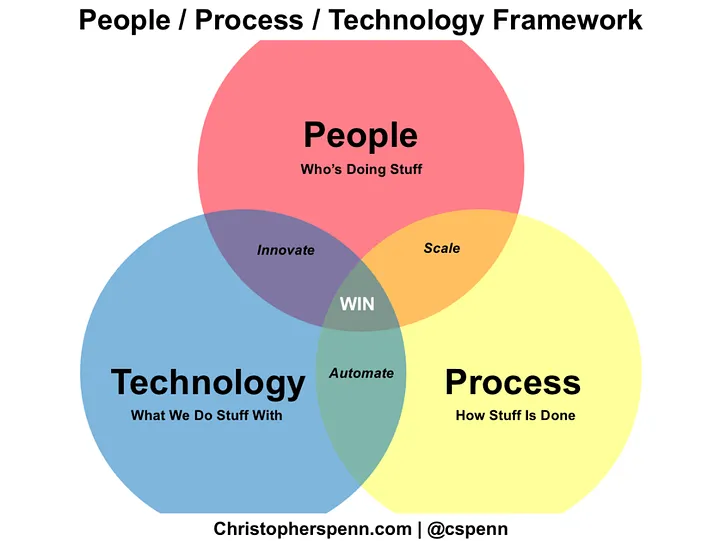.jpg)
Becoming relentlessly driven by data is often the key to making successful business decisions.
But, with so much data to comb through — and so many other things on your team’s plate — actually making use of the data and insights you collect to improve your internal processes is easier said than done.
This is why many companies are opting to make use of knowledge process outsourcing.
What is Knowledge Process Outsourcing?
Knowledge process outsourcing (KPO) is the outsourcing of non-primary business activities that are based on specialized knowledge, expertise, and experience. It involves the outsourcing of business processes that involve the analysis, interpretation, and management of complex data and information.
Basically, KPO providers offer their research skills and industry expertise to help the company they are contracted with to gain access to specialized knowledge and expertise that the company does not have in-house,. In many cases, the KPO provider will actually take complete ownership over the procedural changes to be implemented altogether.
KPO is technically a subset of business process outsourcing, or BPO. However, knowledge process outsourcing is the more complex and dynamic of the two — and can involve outsourcing core processes as a way to improve operational efficiency and effectiveness.
(More on the key differences between KPO and BPO in a bit.)
As things stand, knowledge process outsourcing is trending pretty heavily. According to Precedence Research, the global KPO industry is projected to grow from $95.8B in 2022 to $301.5B in 2030 — a CAGR of 15.41% in eight years.

(Source)
From small, growing businesses to established corporations, more and more companies are relying on KPO to ramp up their efforts and get an edge over their opponents.
Here, we’ll be discussing everything you need to know to get your KPO initiatives up and running.
What Knowledge-Related Processes are Outsourced?
Overall, knowledge process outsourcing centers around high-level business operations that are heavily reliant on data and research — and involves making decisions that often impact the direction of the company as a whole.
That said, KPO can be employed in a number of different areas of an organization:
- Business Operations and Management KPO can be used to optimize standard operating procedures, employee policies, and other more foundational aspects of a company.
- Legal KPO is used to ensure a company’s operations remain compliant, and to mitigate risk at every turn.
- Finance KPO helps teams optimize their investment strategies, cut unnecessary costs, and maximize their returns across the board.
- Marketing KPO takes ownership of a team’s marketing initiatives to ensure they’re reaching the right audience with the right content and offers at all times.
- Product Design and Engineering KPO has specialists provide guidance to optimize product usability, durability, and other value-focused factors — and to minimize waste and resource consumption during the manufacturing process.
Knowledge Process Outsourcing vs. Business Process Outsourcing
Business process outsourcing (BPO) and knowledge process outsourcing (KPO) are both forms of outsourcing that involve the transfer of business processes to external service providers. However, there are some key differences between the two:
1. Level of Expertise
The level of expertise required for the processes involved with KPO is much higher than the expertise needed for typical BPO tasks.
As we mentioned earlier, knowledge process outsourcing involves outsourcing processes that require specialized knowledge, expertise, and experience. These processes are typically higher-level and more complex than those typically outsourced through BPO. BPO, on the other hand, involves outsourcing more routine and transactional business processes that do not require specialized knowledge.
2. Overall Purpose for Implementation
KPO and BPO are used for two very different reasons.
With BPO, the main focus is typically on maintaining an operational status quo — and simply spending less time, money, and other resources to do so. While implementing BPO can enable teams to make more “big picture” improvements to the business over time, the main goal is to streamline things “as is”.
Knowledge process outsourcing, though, is all about evolving your processes, and allowing your business to reach the “next level” in a specific area. Instead of aiming to do the same with less, those implementing KPO are truly looking to do more — even if it means making drastic changes to their current operations.
3. Scope of Tasks
The scope of the operations being outsourced also differ greatly between KPO and BPO.
BPO, for one, focuses entirely on basic tasks that are essential to a business’ operations, but that don’t necessarily differentiate one business from another. For example, a company might use a third-party call center to direct incoming customer service requests — but will actually handle these requests internally.
The knowledge processes in focus with KPO are much “deeper” than the surface-level tasks of BPO. Again, the entire point of KPO is to make significant improvements to these core functions in order to differentiate your company in just as significant ways.
4. Level of Autonomy
BPO and KPO providers also have different levels of autonomy when working with a host company.
Because BPO focuses on low-level, rote tasks, providers typically follow the direction of the company that hired them — and follow them rigidly. While the BPO provider may make some small tweaks to their workflows for the sake of efficiency, they won’t be at liberty to make major changes that could impact the company’s productivity or bottom line.
KPO providers, on the other hand, must be given autonomy in order to do what they’ve been hired to do: to use their knowledge and expertise to make purposeful improvements to the host company’s processes. For host companies, going all-in on KPO means allowing the provider to take full ownership of the process in question, and to give them license to make any changes they deem necessary.
5. Relationship Management
Though managing relationships with both BPO and KPO providers is crucial, the nature of these relationships differs in a few ways.
BPO provider relationships, for one, are more low-touch, with most engagements focused on surface-levels actions and tasks. Communications will usually occur on an as-needed basis — with both parties generally assuming that everything is going well unless notified otherwise.
(That said, regular check-ins with BPO providers are important — but these check-ins don’t usually need to be all that involved.)
KPO provider relationships are much more hands-on and involved. Because these third parties will be more fully integrated into the organization, continuous communication and relationship building is needed to maintain alignment and direction.
Advantages of Knowledge Process Outsourcing
Outsourcing certain knowledge-related processes can be advantageous to your business in a number of ways.
1. Optimize and Evolve Critical Processes
The overarching benefit of implementing KPO is that it enables you to supercharge your business’ most important processes in critical ways.
(Again, the whole point of KPO is to bring in specialists who can figure out exactly what needs to be done — and will help make it happen for your team.)
In some cases, the KPO provider will do the backend research needed to provide clear guidance to your team. In others, you might have the provider take complete ownership of the process — up to and including making fundamental changes to your overall processes.
Either way, a good KPO provider will lead to improved productivity within the specific domain in focus.
2. Plug Your Organization’s Knowledge and Skill Gaps
Companies often bring in KPO providers to essentially create an organizational knowledge map in an effort to plug both known and unknown gaps in their team’s own knowledge and abilities.
Sometimes, the need for a third-party provider is obvious. Here, you’d bring in a provider to make specific improvements to your internal processes, or to fill a known gap in your talent roster.
Other times, though, you might bring in a third-party specialist because you aren’t sure of what needs to improve within your organization. In turn, they’ll conduct in-depth research on your company, your competitors, your customers, and your industry to identify where your team is falling short — and what you need to improve moving forward.
(And, again: The provider may also take full ownership of making these internal improvements to your organization, as well.)
As the saying goes, you don’t know what you don’t know. With the right KPO provider, figuring out what this is — and filling the gap effectively — will be easier than ever.
3. Stay Flexible and Agile
Having access to high-quality KPO providers allows your team to become more flexible, and to react more quickly to changes within your industry.
For one, it’s faster and easier to onboard a KPO specialist than a new hire (or team of hires). As dynamic and fast-paced as most industries have become, quickly getting new initiatives operational is vital to your business’ survival.
(At the very least, you can rely on KPO providers while you work on improving your internal talent pool through training and development.)
Then, when you’re no longer in need of the KPO provider’s services, you can begin to phase down or phase out the relationship over time.
Perhaps you’ve gained the knowledge you needed from them; maybe your team has gained the capacity to complete the tasks in question; or, maybe you’ve simply found a better provider and are looking to move on from your current partner.
In any case, working with a KPO means you can scale your relationship up and down based on your needs and internal capacity.
4. Increased Productivity Throughout the Company
Outsourcing high-level processes in one area of your business can ultimately allow your company to become more productive as a whole.
Since you’ll have optimized productivity in these outsourced areas, you’ll have more time, money, manpower, and other resources to invest elsewhere in your business. Similarly, your KPO partners can help facilitate more effective cross-team collaboration throughout your organization in practical and impactful ways.
What’s more, the nature of KPO services is that providers are always focused on what’s next for their business partners. Again, while BPO providers aim to maintain the status quo, your dedicated KPO providers will continuously help your team raise the bar in ways that matter to your business.
Risks of Knowledge Process Outsourcing
Though knowledge process outsourcing can lead to incredible things for your business, it’s not without its fair share of risks.
As with business process outsourcing, understanding these risks is the first step to warding them off as best you can.
1. A Lack of Operational Control
The biggest risk you take when working with a KPO provider is in handing control of a core business function over to a third party.
This lack of control is a big enough risk when outsourcing surface-level business processes. When it comes to your high-level, knowledge-related processes, you need to be absolutely certain that your provider is steering things in the right direction.
A wider gap in knowledge and/or skills can make this risk even greater. Since you may be unsure of which direction to turn, it will be rather difficult to know whether your provider is truly doing what’s best for your company.
2. Data Security Issues
Providing a third-party organization access to your company’s data and knowledge is always a risk, for many reasons.
You need to trust that your KPO providers will keep your data as secure as possible, up to and including following compliance regulations whenever required. In some cases, their failure to do so can end up causing legal problems and other troubles for your business.
You’ll also inherently be creating opportunities for data to be lost or stolen when transferring it between parties. Of course, you’ll almost always be sending or receiving information of some kind to your KPO partners — making it an ever-present risk for your team to consider.
3. Communication Barriers and Silos
The same barriers to communication that exist with business process outsourcing are prevalent here, as well — and are actually exacerbated quite a bit.
These barriers include:
- Geographical barriers such as different time zones and operational hours
- Cultural barriers that can lead to miscommunications and misunderstood messaging
- Language barriers that relate to both culture and subject matter expertise
Your KPO provider’s communication skills will also play a part here. If their reports, suggestions, and directives are unclear — or if they simply fail to keep other stakeholders in the loop — your team’s productivity will ultimately suffer.
4. Employee Morale and Consumer Perception
When outsourcing your core knowledge processes, you may potentially face some backlash from your employees and your audience.
For one, you risk demoralizing your employees by bringing in outside help instead of investing in their professional development. Worst-case scenario, your employees interpret your contracting out as a sign that they’re about to be laid off.
(While this, of course, is not your intention, you need to be sure your employees know that to be true. More on this in a bit.)
Your customers may also be impacted by the decisions your KPO providers make. Even objectively positive changes to the customer experience can throw your audience off if not communicated well.
Finally, if your KPO partner’s reputation isn’t above board, it can potentially reflect poorly on your company. While you’ll take this into consideration when choosing providers, it’s always possible for your chosen providers to make future changes that don’t jibe with your audience for some reason or another.
Best Practices for Implementing Knowledge Process Outsourcing
Outsourcing your high-level, knowledge-powered company processes can be an effective way to spur massive growth for your business.
But, your outsourcing initiatives can easily go south if you aren’t careful.
Here’s what you need to know as you start outsourcing your high-level internal processes.
1. Optimize Your Knowledge Management Processes
A cohesive and comprehensive knowledge management strategy that makes use of knowledge base software is a prerequisite for getting the most out of your KPO relationships..
For one, it provides easy access to your outsourcing contracts, service level agreements, and other related documentation. This allows you to quickly deliver the necessary documentation when forming agreements — and also allows all stakeholders to access these documents as needed over time.
Making use of knowledge base software will also allow you to house documentation related to your team’s current processes, along with related historical performance data. This will give your KPO partners insight into what works (and what doesn’t) within your organization — in turn giving them clear direction for how to proceed.
Finally, implementing a knowledge base will allow you to better share documentation regarding your company’s mission, vision, and values. This will help your KPO providers stay focused on your team’s “true north” as they make more specific improvements to your operations.
2. Define Your Rationale for Outsourcing
Your first order of business is to define your reasoning for wanting to outsource in the first place.
There are a number of factors to consider when nailing this down:
- Your business’ current performance as compared to your goals
- Your capacity to make the necessary changes without outside assistance
- Whether outsourcing more surface-level tasks would better enable your team
To be sure, we’re not saying that KPO should be your last resort — not by any stretch.
But we are saying you should do due diligence to ensure that you’re not outsourcing in lieu of making internal improvements that are well within your reach. And you need know that outsourcing your high-level processes won’t unwittingly lead your company astray from your overall vision.
3. Prioritize Domains and Tasks to Outsource
At this point, you probably have a good idea of which areas of your business to outsource.
Now, you’ll want to prioritize these domains based on your current situation: Where are you losing the most money? Where are you struggling to meet your goals most? Where do you see the most (and most fruitful) opportunities for future growth?
Once you’ve prioritized a given domain, you can then narrow things down to the specific tasks and subtasks you need help with.
While it’s certainly possible to outsource different tasks in multiple domains at the same time, a slow rollout is recommended for those just getting started.
For one, there will still be work for your team to do even when your outsourced partners take control. What’s more, after outsourcing certain tasks in one area, you may end up being more equipped to handle other tasks in-house, after all.
4. Identify KPO Candidates
Having clearly defined the domain and set of tasks to be outsourced, you’ll then start assessing your potential KPO service providers.
The key factors to consider here are the provider’s:
- Expertise and Services Offered: The KPO provider must offer the specific services and possess the exact knowledge needed to navigate the data-heavy processes at hand. As impactful as their efforts will be to your business, you need to be 100% certain they know what they’re talking about.
- Operational Frameworks & Processes, and Resources Used: Your KPO provider’s processes must be above board for legal and regulatory purposes. Their processes should also be backed by research to show effectiveness.
- Performance History and Reputation: Look for KPO providers that have extensive experience and success working with companies that are similar to yours in makeup and need. You also want to know that your KPO candidates have grown over time to enhance the services they provide their clientele.
- Costs and Contractual Terms: You of course need to know that outsourcing a high-level process will be more cost-effective than going in-house — and that the benefits of doing so will far outweigh any costs accrued. Also, be sure your provider offers terms that align with your long-term goals, and allow you the flexibility needed to achieve them.
5. Set Terms and Manage KPO Relationships
Once you’ve identified the best KPO provider for your needs, you’ll want to get the relationship started off on the right foot — and keep things moving in the right direction.
Start by getting your team and provider aligned regarding terms of operation and engagement.
Here, you’ll want to define:
- Terms for data governance and risk management
- Terms for cross-team communication (e.g., schedules, priorities, channels, etc.)
- Processes for storing, transferring, and accessing organizational data and knowledge
The more intentional you are in defining these terms from the start, the easier it will be to maintain alignment as time goes on.
That said, managing your relationships with your KPO providers will then involve:
- Tracking domain-specific performance and overall business performance
- Improving communication and collaborative efforts, and better enabling the provider
- Ramping up and dialing back KPO provider relationships as needed
Ultimately, your KPO partners should be seen as unofficial members of your team by all involved parties. Much like your actual team members, then, these third-party providers must be kept in the loop at all times.
6. Employ Continuous Change Management and Knowledge Management
As your KPO providers dig into their research and begin making improvements to your systematic processes, you need to be sure your team is prepared for the changes to come.
In short:
Ongoing change management is crucial.
Preparing your team members for procedural changes requires:
- Informing them of the changes to be made in full, well ahead of time
- Explaining the rationale behind the changes — especially as it pertains to them
- Collaboratively creating a plan for a seamless and productive transition
Then, as your KPO providers continue collecting data, noticing emerging trends, and uncovering new insights, you need to be sure this knowledge is documented and stored properly.
That is, it should be stored within your organization’s knowledge base, as well as your provider’s. This will minimize the risk of data loss on both ends, and will enable your team to make use of your provider’s findings both now and in the future — even if you eventually part ways with the provider.
Using Helpjuice to Empower Your KPO Providers
Your organization’s collective data and knowledge is central to your KPO providers’ efforts.
That said, they need to have open access to any information you possess that could help them better perform their duties.
The best way to provide this access?
Helpjuice.
With our knowledge base software, your KPO partners will have access to the information needed to do what you’ve hired them to do. You can also allow them to add to your collective knowledge over time — ensuring you can take advantage of their learnings even if you end up parting ways.
Want to check out Helpuice in action? Book a free demo with our team today.



